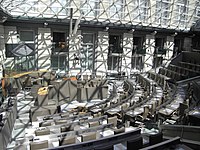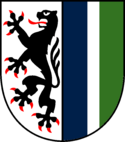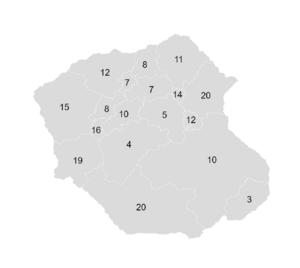Folkssenaat: Difference between revisions
m (→Requirements) |
|||
| Line 126: | Line 126: | ||
| 2 | | 2 | ||
|- | |- | ||
| rowspan=" | | rowspan="4" bgcolor=#D5305F| | ||
| rowspan=" | | rowspan="4"|Social Democrats <br>in the Folkssenaat | ||
| width="1" bgcolor=#D5305F| | | width="1" bgcolor=#D5305F| | ||
| [[Progressive Holsteen]] | | [[Progressive Holsteen]] | ||
| 17 | | 17 | ||
|rowspan=" | |rowspan="4"| '''52''' | ||
|- | |- | ||
| width="1" bgcolor=#F0928F| | | width="1" bgcolor=#F0928F| | ||
| Line 140: | Line 140: | ||
| [[Social Democrats of Delland]] | | [[Social Democrats of Delland]] | ||
| 15 | | 15 | ||
|- | |||
| width="1" bgcolor=#872E5C| | |||
| [[Kirenian People's Party]] | |||
| 4 | |||
|- | |- | ||
| rowspan="3" bgcolor=#FFC600| | | rowspan="3" bgcolor=#FFC600| | ||
| Line 155: | Line 159: | ||
| [[Humanist Sotirian Union]] | | [[Humanist Sotirian Union]] | ||
| 10 | | 10 | ||
|- | |- | ||
| rowspan="2" bgcolor=#0BD02C| | | rowspan="2" bgcolor=#0BD02C| | ||
| Line 191: | Line 172: | ||
|- | |- | ||
| rowspan="2" bgcolor=#ab1010| | | rowspan="2" bgcolor=#ab1010| | ||
| rowspan="2"| | | rowspan="2"|The Left <br>in the Folkssenaat | ||
| width="1" bgcolor=#0BD02C| | | width="1" bgcolor=#0BD02C| | ||
| [[Workers Party - Left List]] | | [[Workers Party - Left List]] | ||
| Line 207: | Line 188: | ||
| 11 | | 11 | ||
|rowspan="1"| '''11''' | |rowspan="1"| '''11''' | ||
|- | |||
| rowspan="4" bgcolor=#661EC0| | |||
| rowspan="4"|Nationalists and Regionalists<br>Group in the Folkssenaat | |||
| width="1" bgcolor=#E4D323| | |||
| [[Future of Delland]] | |||
| 3 | |||
|rowspan="4"| '''8''' | |||
|- | |||
| width="1" bgcolor=#8C001C| | |||
| [[Weranian People's Party]] | |||
| 3 | |||
|- | |||
| width="1" bgcolor=#2C6731| | |||
| [[Swerdian Nationalist List]] | |||
| 1 | |||
|- | |||
| width="1" bgcolor=#000000| | |||
| [[Estmerish Alliance]] | |||
| 1 | |||
|- | |- | ||
| rowspan="5" bgcolor=#D7D7D7| | | rowspan="5" bgcolor=#D7D7D7| | ||
| Line 220: | Line 220: | ||
|- | |- | ||
|} | |} | ||
==Members and elections== | ==Members and elections== | ||
[[File:Alsland electionmap numbers.png|thumb|left|Distribution of seats between constituencies]] | [[File:Alsland electionmap numbers.png|thumb|left|Distribution of seats between constituencies]] | ||
Revision as of 14:38, 14 May 2022
This article is incomplete because it is pending further input from participants, or it is a work-in-progress by one author. Please comment on this article's talk page to share your input, comments and questions. Note: To contribute to this article, you may need to seek help from the author(s) of this page. |
People's Senate Folkssenaat Volkssenat Rahva senat | |
|---|---|
| 34th Folkssenaat | |
 | |
| History | |
| Founded | October 31, 1919 |
| Preceded by | TBD |
| Leadership | |
President of the Folkssenaat | Arved Levandi, MDP since 10 May 2017 |
Vice Presidents of the Folkssenaat | |
| Structure | |
 | |
Political groups | Government (103)
Opposition (94) |
| Elections | |
| Party-list proportional representation (PLPR) | |
Last election | 3 September 2018 |
Next election | 5 September 2022 |
| Meeting place | |
 | |
| Website | |
| folkssenaat | |
 |
|---|
| This article is part of a series on the politics and government of Alsland |
|
|
The Folkssenaat ("People's senate") is the Alslandic federal parliament. The Folkssenaat sits in the Senaatsgebou in Yndyk. Since 1995 the Folkssenaat has been a Unicameral Legislature of Alsland after the Federal Assembly was merged into the Senate . The Folkssenaat has 201 Senators who are elected via the Party-list proportional representation system.
The Senate is led by a President and 2 Vice-Presidents who usually come from each major bloc. The role of the President rotates between the Vice-Presidents who are replaced as a Vice-President upon their election as President of the Senate. The President serves for a term of 1 year. Vice-Presidents are elected between members of the Senate.
Requirements
To be a candidate for the Senate a citizen must be at least 18 years old and a citizen and current resident of Alsland.
A Senator can only enter office after taking the oath of office. The oath is as follows: "I swear to uphold the Constitution of the United Provinces of Alsland, to dedicate my efforts to the well-being of the Alslandic people, to promote their welfare and protect them from harm." (Dellish: Ik swar de Grûnwet fan 'e Feriene Provinsjes Aalslân te hanthavenjen, har wolwêzen te befoarderjen, har te beskermjen tsjin skea en myn ynset te wijden oan it wolwêzen fan it Alslandyske folk, Weranian: Ich schwöre, die Verfassung der Vereinigten Provinzen von Aalsland aufrechtzuerhalten, ihr Wohlergehen zu fördern, sie vor Schaden zu schützen und meine Bemühungen dem Wohl der Aalsländer Bevölkerung zu widmen, Kirenian: Vanden toetada Alslandi Ühendatud Provintside põhiseadust, edendada nende heaolu, kaitsta neid kahju eest ja pühendada oma jõupingutused Alslandi inimeste heaolule)
A Senator must also resign other provincial or local offices upon becoming a Senator. The same rule applies vice-versa if a Senator takes up a role in Provincial or Local politics. Senators also may not be serving in the Judiciary or be a current civil-servant. Civil-servants are able to be granted political leave and don't need to resign their position upon being elected as a Senator.
President and Vice-Presidents
Parliamentary groups
Alongside blocs, there have been several Parliamentary Groups within the Folkssenaat, as of 2021 there are 8 Parliamentary groups in total. Parliamentary groups exist alongside parties. Member parties in Parliamentary groups have similar ideologies and tend to vote together and their Senators usually sit together. A group must have 5 Senators and be represented in at least 2 communities to be registered as a political group.
Members and electionsAs of December 12 2021 there are 201 Senators. Alsland's 18 provinces each elect their own senators. Prior to the merging of the Federal Assembly and the Senate the Senate had 151 members who were elected via constituencies using the Single transferrable vote system. The Assembly had a further 80 members who were elected using the current Party-list proportional representation system. When the two houses were merged the Senate adopted the Party-list proportional representation system and abolished the previous constituency system. CommitteesThe Folkssenaat has several committees each with a responsibility over different parts of the government. The committees examine legislative proposals. Each committee is divided proportionally between the parties based on their current seat total within the Folkssenaat. The current Senate committees are: ProcedureLatest electionCurrent compositionThe current composition of the Folkssenaat, as of August 2021:
Historical compositions |
||||||||||||||||||||||||||||||||||||||||||||||||||||||||||||||||||||||||||||||||||||||||||||||||||||||||

